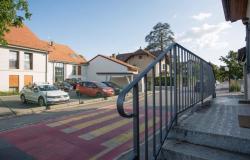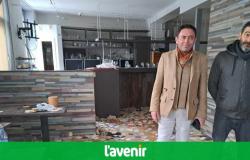Thousands of Internet users let themselves be carried away by the magic of the Holidays and fell for a viral video visibly generated by artificial intelligence representing Old Quebec with two Frontenac Châteaux.
On December 10, the TikTok account @cozychristmasarchivewhich has more than 40,000 subscribers, published a video in which we see magical landscapes passing by in what seems to be the heart of Old Quebec.
We can vaguely distinguish the Château Frontenac and the Place Royale while the voice of Céline Dion sings a cover of the classic Happy XMas (War is over) de John Lennon et Yoko Ono.
“Enter the magic of Quebec City at Christmas. The snowy streets, twinkling lights and European charm make it the perfect winter wonderland,” reads the description of the post which has been viewed more than 3.3 million times.
In this fake video of Old Quebec, we see two buildings which are similar to the Château Frontenac and which were created from scratch by AI, just like the enchanting decor.
Screenshot from TikTok – cozychristmasarchive
Too good to be true
Several users of the platform pointed out that this warm montage was “too good to be true”… and they are right.
This is undoubtedly a video designed with the help of artificial intelligence, as evidenced by the presence of two Château Frontenacs and illegible or upside-down signs, typical of false images created by AI , which we find in the fronts of shops that do not exist.
In the photo, we see a store front whose name is illegible, a clear sign of the use of AI.
Screenshot from TikTok – cozychristmasarchive
According to this montage, the iconic castle of the old capital can be seen from almost every angle with a low-angle view from just about anywhere. However, this is not the case in reality.
For residents of Quebec and tourists who don’t know it, huge fir trees that shine with a thousand lights are installed here and there in the countless pedestrian streets of Old Quebec during the holiday season. At least, in this romanticized version of Old Quebec, because that is not the case.
Made aware of the video, the office of Mayor Bruno Marchand recognized that it was an AI montage. He also preferred to refrain from comments.
For his part, the general director of Destination Québec Cité, Robert Mercure, recalls that it is essential for his organization to inform tourists with truthfulness and credibility.
![[À VOIR] Two Châteaux Frontenac, huge fir trees everywhere: a fake video of Old Quebec seen millions of times](https://euro.dayfr.com/content/uploads/2025/01/02/7d03bd1a71.jpg)
If we rely on this image, Quebec should be famous for its church gable floating in the sky and for its trees growing on the roofs.
Screenshot from Tiktok – cozychristmasarchive
“Although flattering for Quebec, this video remains false. It is essential for us to act ethically by presenting our region for what it really is, and not in a doctored version,” he says.
Mass sharing
This deception has been shared tens of thousands of times on various social networks, including X. The member for Louis-Saint-Laurent, Gérard Deltell, was himself caught.
![[À VOIR] Two Châteaux Frontenac, huge fir trees everywhere: a fake video of Old Quebec seen millions of times](https://euro.dayfr.com/content/uploads/2025/01/02/3429f14a34.jpg)
An Internet user challenged users by writing “doesn’t Quebec City look like a real postcard? », to which the elected conservative of the region replied “yes and welcome!”.
Contacted by The JournalMr. Deltell did not respond to our request for an interview.
Director of communications under the Harper government and now political analyst, Dimitri Soudas, for his part, shared the video on his own X account with the mention “everyone has two cities in their heart: theirs and Quebec”. Several comments also point out that these are images created by AI.
Vigilance
Fake videos like this have been called AI Slops by artificial intelligence experts. Among other things, there are fake images that aim to generate interactions by showing sensationalist content.
The creator of that of Old Quebec did not indicate that the images were created with artificial intelligence, as required by TikTok’s policy in this area. The user behind the account did not respond to our questions.
![[À VOIR] Two Châteaux Frontenac, huge fir trees everywhere: a fake video of Old Quebec seen millions of times](https://euro.dayfr.com/content/uploads/2025/01/02/2ddd5a8ad2.jpg)
This street does not exist in Quebec. No street stretches over such a long distance with a majestic low-angle view of the Château Frontenac.
Screenshot from Tiktok – cozychristmasarchive
On December 19, Concordia University educational technology professor Florent Michelot expressed concern about the growing realism of images created with AI.
He was referring to a fake that featured a fake Prime Minister Justin Trudeau announcing his resignation which caused a stir on social networks.

![[À VOIR] Two Châteaux Frontenac, huge fir trees everywhere: a fake video of Old Quebec seen millions of times](https://euro.dayfr.com/temp/resized/medium_2025-01-02-93aa7cab3e.jpg)
![[À VOIR] Two Châteaux Frontenac, huge fir trees everywhere: a fake video of Old Quebec seen millions of times](https://euro.dayfr.com/temp/resized/medium_2025-01-02-2f9de1da40.jpg)
![[À VOIR] Two Châteaux Frontenac, huge fir trees everywhere: a fake video of Old Quebec seen millions of times](https://euro.dayfr.com/temp/resized/medium_2025-01-02-7d03bd1a71.jpg)
![[À VOIR] Two Châteaux Frontenac, huge fir trees everywhere: a fake video of Old Quebec seen millions of times](https://euro.dayfr.com/temp/resized/medium_2025-01-02-3429f14a34.jpg)
![[À VOIR] Two Châteaux Frontenac, huge fir trees everywhere: a fake video of Old Quebec seen millions of times](https://euro.dayfr.com/temp/resized/medium_2025-01-02-2ddd5a8ad2.jpg)




